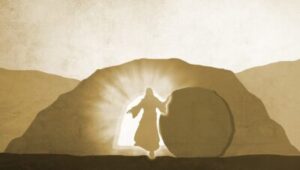The Old Testament is the Bible that is also used as the sacred book of Judaism and is accepted as the Christian Old Testament.
The Old Testament is a collection of religious texts that are considered sacred in both Judaism and Christianity. In Judaism,
these texts are known as the Hebrew Bible or Tanakh, and they consist of three main sections

the Torah (the Five Books of Moses), the Nevi'im (the Prophets), and the Ketuvim (the Writings).
The Old Testament is also accepted as part of the Christian Bible, preceding the New Testament, and it includes the same books as the Hebrew Bible but arranged in a slightly different order.

The Old Testament holds significant religious and historical importance for both Judaism and Christianity.
The New Testament consists of documents about the life, teachings, and formation of the church by the apostles of Jesus Christ.
The New Testament is the second part of the Christian Bible and it contains writings that focus on the life, teachings, and resurrection of Jesus Christ, as well as the formation and early history of the Christian church.

It consists of 27 books, which include the four Gospels (Matthew, Mark, Luke, and John), the Acts of the Apostles, the Epistles (letters) of various apostles, and the Book of Revelation.

The Gospels provide accounts of Jesus' life, ministry, miracles, and teachings, while the Acts of the Apostles narrates the early history of the Christian church and the spread of Christianity after Jesus' ascension.

The Epistles are letters written by apostles such as Paul, Peter, James, and John to various Christian communities, offering guidance, encour agement, and theological teachings.

The Book of Revelation is an apocalyptic book attributed to the apostle John, containing symbolic visions and prophecies about the end times.
Together, the Old and New Testaments form the Christian Bible, and the New Testament specifically focuses on the life of Jesus and the teachings and early history of the Christian faith.
It includes the four Gospels of Matthew, Mark, Luke, and John, the Acts of the Apostles, and the letters of Paul.
The New Testament includes the four Gospels of Matthew, Mark, Luke, and John, as well as the Acts of the Apostles and the letters of Paul, among other writings.

The four Gospels provide accounts of the life, ministry, teachings, and resurrection of Jesus Christ from different perspectives. Matthew, Mark, and Luke are known as the Synoptic Gospels because they share many common stories and themes, while John offers a distinct perspective on Jesus' life and teachings.

The Acts of the Apostles, written by Luke, details the early history of the Christian church after Jesus' ascension, focusing on the ministry of the apostles, particularly Peter and Paul, and the spread of Christianity.

The letters of Paul, also known as the Pauline Epistles, are a collection of letters written by the apostle Paul to various early Christian communities. These letters offer theological teachings, practical instructions, and pastoral guidance on various topics, addressing specific issues and challenges faced by those communities.

In addition to the Gospels, Acts, and Pauline Epistles, the New Testament includes other letters (such as those attributed to James, Peter, John, and Jude) and the Book of Revelation, which is an apocalyptic work attributed to the apostle John.
The Protestant Bible consists of 39 Old Testament books and 27 New Testament books.
The Protestant Bible consists of 39 books in the Old Testament and 27 books in the New Testament. This collection of 66 books is commonly referred to as the Protestant canon.

In the Old Testament, the books include historical accounts, poetry, prophetic writings, and legal codes. These books are shared by both the Jewish Tanakh (Hebrew Bible) and the Protestant Old Testament. The Old Testament books are divided into several categories, including the Law (Torah), Historical Books, Wisdom Literature, and the Prophets.
The New Testament contains the four Gospels (Matthew, Mark, Luke, and John), which record the life, teachings, and resurrection of Jesus Christ. It also includes the Acts of the Apostles, which details the early history of the Christian church, as well as various Epistles (letters) written by apostles such as Paul, Peter, James, John, and Jude. The New Testament concludes with the Book of Revelation, an apocalyptic work attributed to the apostle John.